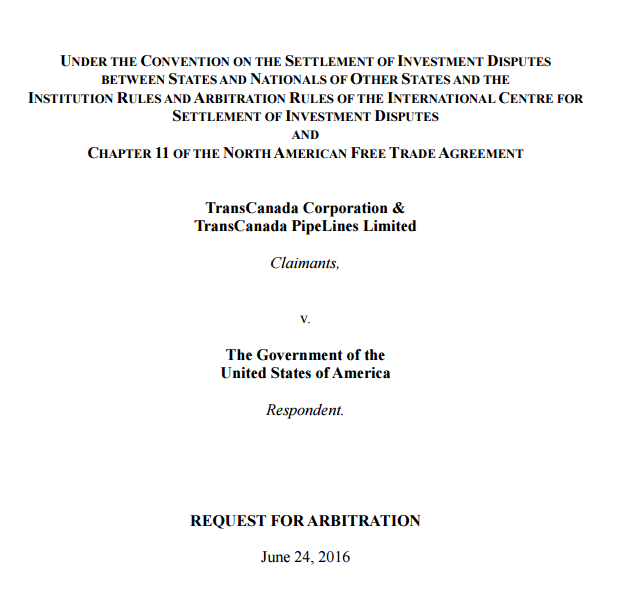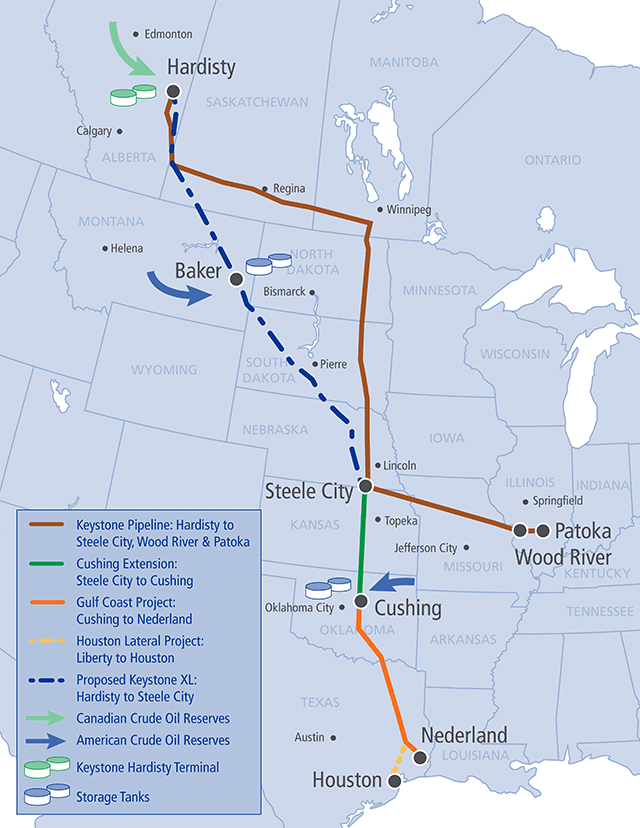TransCanada seeks US$15 Billion from the U.S. government for breaches of NAFTA – following President Obama’s decision to nix the Keystone XL pipeline
The next chapter in the Keystone XL pipeline saga is officially underway.
On Friday, June 24, 2016, TransCanada Corporation (ticker: TRP) filed an official request for arbitration against the government of the U.S., under the rules of the International Centre for Settlement and the North American Free Trade Agreement.
The Canadian company–with 5,400 employees in the U.S. and Canada–is suing the U.S. under Chapter 11 of NAFTA, which states members agree to treat investors of other NAFTA countries no less favorably than their own, something TRP says the U.S. administration failed to do when it rejected the Keystone XL pipeline for reasons other than the merits of the project.
This is the latest development in the almost eight-year running saga of the Keystone XL pipeline. The saga began on Sept. 19, 2008—that was the day that TransCanada originally submitted its first application to build the Keystone XL pipeline with the United States government.
Last Friday, TransCanada made it official. It is seeking damages of more than US$15 billion plus interest, attorney’s fees and other expenses – because of a U.S. breach of its obligations under NAFTA, according to the complaint.
At issue is the sudden rejection last November by the Obama administration/Department of State of TransCanada’s application to build the Keystone XL pipeline. TransCanada is basically saying that the U.S. government was essentially stringing the company along for seven years in the application and permitting process, during which time the company purchased pipe and equipment while bending over backwards to meet every demand by the United States government and other stakeholders in order to obtain the department’s approval to build the 800-mile cross-border oil pipeline.
In an interview in March of 2015 with TransCanada’s President of Keystone Projects Corey Goulet, Oil & Gas 360® learned from Goulet that at that time TransCanada had already invested more than $2 billion in the project.
“We’ve invested about $2.5 billion so far: we’ve bought just about all the pipe and the pumps and motors. We’ve completed most of the engineering and we’ve spent six and a half years in the permitting process. What’s left to do? Once we get the president’s signature and the state permits, we have to get approvals from the U.S. Army Corps of Engineers, the U.S. Fish and Wildlife Service and hundreds of county permits. After that we can start construction and that will be about two years of work,” Goulet told Oil & Gas 360® at the time.
But that particular string of events was not to be. The reason: the decision by the Obama administration to use the Keystone XL to play climate change politics, according to TransCanada’s official request for arbitration.
“For political reasons … the State Department refused to expedite the processing of Keystone’s applications, and ultimately took over seven years to make a decision,” the TransCanada complaint states.
“Respondent [the government of the United States] ultimately denied Keystone’s application, not because of any concerns over the merits of the pipeline, but because President Obama wanted to prove his administration’s environmental credentials to a vocal activist constituency that asserted that the pipeline would lead to increased production and consumption of crude oil and, therefore, significantly increased greenhouse gas (“GHG”) emissions.
“Respondent knew those assertions were false,” the complaint goes on. “In fact, the State Department had issued five Environmental Impact Statements between 2008 and 2015, all of which concluded that the Keystone XL Pipeline would not result in a significant increase in GHG emissions. The state Department reiterated that conclusion for a sixth time when it denied Keystone’s second application in November 2015.
“The Keystone XL project was not controversial when Keystone submitted its first application in 2008. Indeed, several other pipelines were already in operation or being constructed in the Unites States at the time to deliver Canadian oil to U.S. refineries. The project became highly politicized, however, after a series of high profile accidents in the oil and gas sector (none of which involved TransCanada), and as environmental activists grew frustrated with the perceived failure of the Administration to take meaningful steps to reduce U.S. GHG emissions.
“Concocting an argument that denying the proposed pipeline would halt or slow development of the Canadian oil sands, environmental organizations seized on the Keystone XL Pipeline as a rallying point to energize the activist community. According to John Podesta, a former top advisor to President Obama, “People were beginning to doubt the President’s commitment. [The Keystone XL Pipeline] became the test of the question: Are we going to do anything long term about climate change?, as he had promised in the 2008 election.
Complete Reversal of Course by Obama Administration
In its formal complaint, TransCanada makes the case that the Obama administration completely reversed course from the president’s earlier comments about Keystone XL after pressure from the environmental movement.
The complaint quotes President Obama on American-Made Energy at the Cushing Pipe Yard in Cushing, Oklahoma, March 22, 2012. In that speech the president delivered his full approval of the pipeline.
Obama: “Now, right now, a company called TransCanada has applied to build a new pipeline to speed more oil from Cushing to state-of-the-art refineries down on the Gulf Coast. And today, I’m directing my administration to cut through the red tape, break through the bureaucratic hurdles, and make this project a priority, to go ahead and get it done… .”
But as the global warming activist movement became louder, Keystone was chosen to be its poster child for climate change and anti-oil demonstrations. “As the administration continued to dither and make excuses for delaying a decision on the application, the politicization of the review process accelerated,” the complaint states.
The Record of Decision (ROD) “concluded that the Keystone XL Pipeline would be less GHG intensive than alternative means of transporting oil from Alberta to the Gulf Coast, and would reduce the risk of oil spills compared to rail transportation.”
“The State Department decided to deny the permit nonetheless. That decision was based not on the Keystone XL pipeline’s actual or anticipated impact on the environment, but on the desire to prove U.S. leadership credentials to environmental activists and foreign governments who supposedly believed, incorrectly, that the pipeline actually would result in greater GHG emissions.
Prioritizing Political Perceptions over Jobs, NAFTA Agreement
“As the ROD explained, ‘While the proposed project by itself is unlikely to significantly impact the level of GHG-intensive extraction of oil sands crude or the continued demand for heavy crude oil at refineries in the United States, it is critical for the United States to prioritize actions that are not perceived as enabling further GHG emissions globally’.
“Secretary [of State] Kerry concluded that ‘[t]he critical factor in my determination was this: moving forward with this project would significantly undermine our ability to continue leading the world in combating climate change’.”
“The decision the Administration eventually made—i.e., that the Keystone XL Pipeline was no in the U.S. national interest because approving the pipeline would hurt the perception of the United States as a leader on climate change—could, if it had any legitimacy, have been made immediately after Keystone submitted its application. For political reasons, however, the State Department delayed its decision for seven years, with full knowledge that TransCanada was continuing to invest billions of dollars in the pipeline project in the legitimate but ultimately false belief—a belief that had been based on the administration’s assurance—that the administration would decide Keystone’s application based on the merits.
TransCanada goes on to say in the document that it has sought to settle its claims and that at its request, representatives of Claimants and Respondent (TransCanada and the U.S. government) met on April 26, 2016 at the U.S. Department of State for the purpose of settlement negotiations. “Unfortunately, notwithstanding Claimants’ good faith efforts to settle their dispute with Respondent, they have been unable to do so,” the TransCanada Request for Arbitration concludes.




